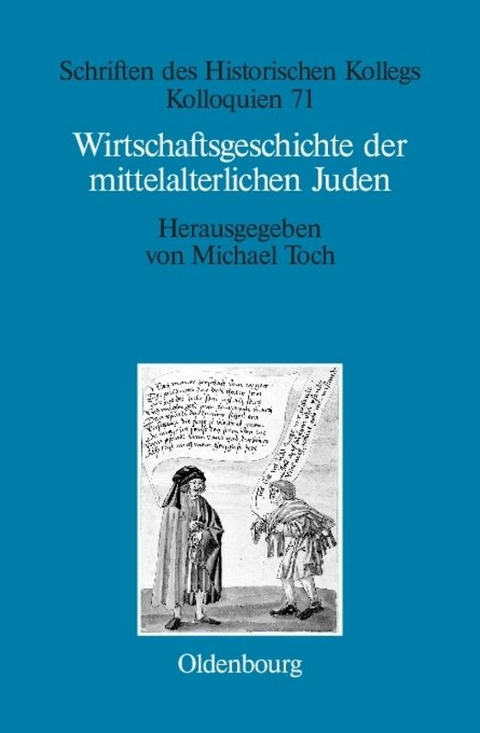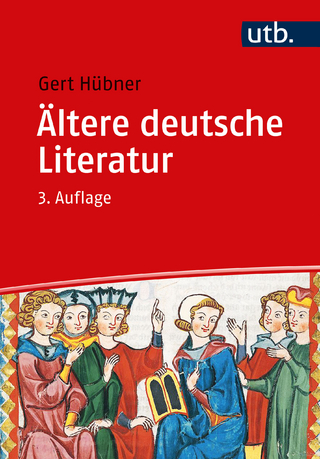
Wirtschaftsgeschichte der mittelalterlichen Juden
De Gruyter Oldenbourg (Verlag)
978-3-486-58670-1 (ISBN)
Bei jeder Betrachtung des Lebens der mittelalterlichen Juden werden zwar die wirtschaftlichen Aspekte erwähnt, ihre wissenschaftliche Untersuchung bleibt jedoch meist oberflächlich und von den Erkenntnissen der Wirtschaftsgeschichte abgekoppelt. Forscher aus Deutschland, Großbritannien, Israel, den Vereinigten Staaten, Italien und Österreich decken in diesem Band daher nicht nur das Spektrum der wirtschaftlichen Tätigkeiten der mittelalterlichen Juden in ihren Gastgesellschaften auf, ihr Ziel war auch, den "Wirtschaftsgeschichten" nachzugehen und zentrale Komplexe wie Geldleihe, Buchhaltung, Armenfürsorge, Frauenarbeit anhand neuerer Forschungserkenntnisse auszuleuchten. Beiträge von: David Abulafia, Rainer Barzen, Annegret Holtmann, David Jacoby, Martha Keil, Reinhold Mueller, Hans-Georg von Mutius, Joseph Shatzmiller, Michael Toch, Giacomo Todeschini, Markus Wenninger.
Michael Toch, geboren 1946, ist Professor für mittelalterliche Geschichte an der Hebräischen Universität von Jerusalem.
Beiträge von: David Abulafia, Rainer Barzen, Annegret Holtmann, David Jacoby, Martha Keil, Reinhold Mueller, Hans-Georg von Mutius, Joseph Shatzmiller, Michael Toch, Giacomo Todeschini, Markus Wenninger
"Insgesamt bieten die vielfältigen und ertragreichen Beiträge des vorliegenden Sammelbandes einen hervorragenden Einblick in die wirtschaftlichen Tätigkeiten des mitteleuropäischen und nordmediterranen Judentums während des Mittelalters, der sowohl den Interessenten jüdischer Geschichte als auch denjenigen allgemeiner Wirtschaftsgeschichte zur Lektüre nahegelegt werden kann." Jörg R. Müller, Zeitschrift für Historische Forschung, Bd. 37, Heft 3, 2010
Christian Perceptions of Jewish Economic Activity in the Middle Ages (p. 1)
The most common and long surviving Jewish stereotype elaborated by Christian culture during the Middle Ages is the image of the Jewish usurer. On the double and interconnected subject, the economic activity of the Jews in the Middle Ages and its Christian representation or description, one can read in historical studies or manuals several common places. They are summed up by the idea that usury actually was, still in the high Middle Ages, the more typical economic activity of the European Jews. Before analysing that strange encounter between medieval and historiographical stereotypes, I believe it is essential to have in mind the texts regarded as basic by medieval Christian authors when they utilised the word "usury" usura to represent Jewish economic activity as a manifestation of greed.
In fact, the formation of the Jewish usurious stereotype is deeply rooted in the inner logic and vocabulary of Christian economics. When we read Medieval Latin sources on economic arguments, it is important to understand that these representations of economic activity are in most cases sections of ecclesiastical sources regarding both the real and symbolic representation of Christian society.
So they draw on the traditional ecclesiastic language concerning both the earthly and eternal happiness of the Christians. It is well known that medieval Christian authors ignore Jewish economic culture and laws or do not pay attention to them, with the consequence that Christian economic sources represent economic Jewish activities as totally subordinate to the Christian vision of the world.
We cannot however deduce from that Christian misrepresentation that Jewish economic culture and laws did not exist or that the economic life of medieval Jews simply consisted in a reiteration of stereotyped behaviours like those depicted by the word "usury". Similarly, when analysing the formation of Christian economic language, it is inappropriate to disregard the theological vocabulary and to separate it from what we, today, conceive as a purely economic vocabulary. In the books of Deuteronomy and Leviticus as in the Psalms, that is the sources common to the Jewish and Christian traditions, the giving and receiving of interest on a loan is forbidden, especially when the borrower is a poor, loan on interest is admitted when the borrower is a stranger, that is a non-Jew (nokhri), that is to say a person not subject to Jewish law.
While medieval Christian authors did know these texts in the Greek Septuaginta version or in the Latin version ascribed to Jerome – the so-called Vulgata – they generally did not know or disregarded the Hebrew Bible as well as the halakhic definitions of usury and contracts offered by the mishnaic and talmudic treatises on damages.
Their lack of familiarity with these sources had important consequences. For instance, the word "nokhri", stranger, which in the Hebrew text indicated the person who could pay interest, in the Septuaginta version became (αλλò;τριος) allò;trios, "alien", and then, in the Vulgata, alienus.
The last step of this semantic transformation was taken by the Glossa ordinaria, the medieval commentary to the Bible (standardised in the twelfth century), which established an equivalence between the word alienus and the word infidelis or iniquus.
| Erscheint lt. Verlag | 20.10.2008 |
|---|---|
| Reihe/Serie | Schriften des Historischen Kollegs ; 71 |
| Co-Autor | Elisabeth Müller-Luckner |
| Zusatzinfo | 1 b/w ill. |
| Verlagsort | Basel/Berlin/Boston |
| Sprache | deutsch |
| Maße | 154 x 235 mm |
| Gewicht | 475 g |
| Themenwelt | Geschichte ► Allgemeine Geschichte ► Mittelalter |
| Geschichte ► Teilgebiete der Geschichte ► Wirtschaftsgeschichte | |
| Schlagworte | Geschichte • Historisches Kolleg • Juden • Juden, Geschichte; Sozial-/Wirtschafts-Geschichte • Jüdische Geschichte • Mittelalter • Mittelalter/Mediävistik • Mittelalter; Sozial-/Wirtschafts-G. • Sozial- und Wirtschaftsgeschichte • Wirtschaftsgeschichte • Zeitgeschichte • Zeitgeschichte bis 1933 |
| ISBN-10 | 3-486-58670-X / 348658670X |
| ISBN-13 | 978-3-486-58670-1 / 9783486586701 |
| Zustand | Neuware |
| Haben Sie eine Frage zum Produkt? |
aus dem Bereich


